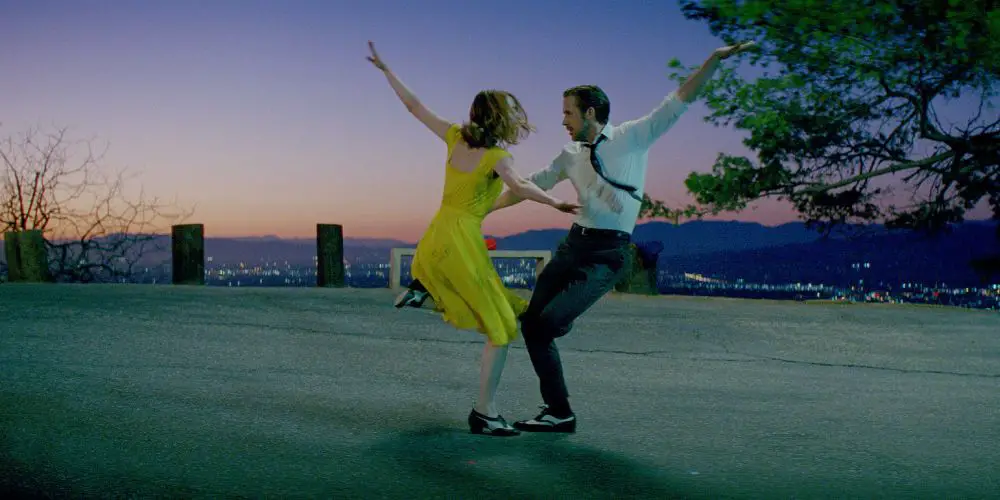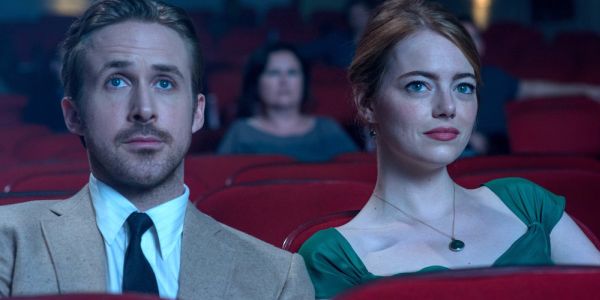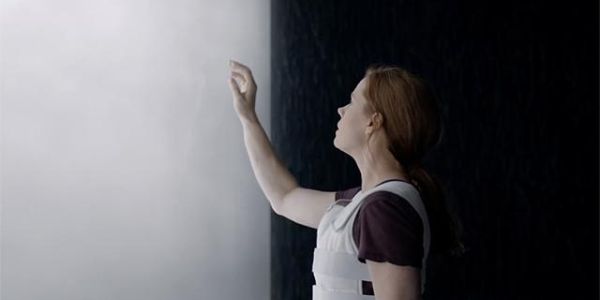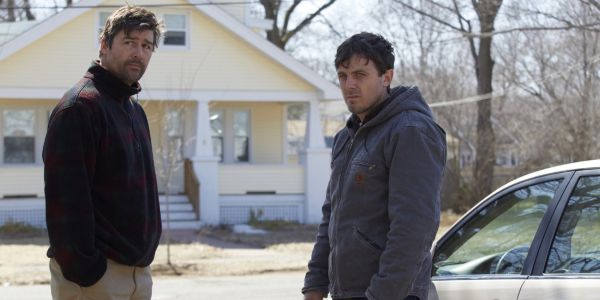TIFF Diary #3: City Of Stars

Tomas is a chronic cineaste who studied English literature in…
When I go to TIFF, I like to mix it up: if I get a ticket to a hot title, I’ll also check out something lesser known (or without a distributor). Most times, my screening schedule alternates so that buzzy films and unknown quantities are spaced out fairly evenly. This year, it chanced that three very popular screenings all coalesced on a Tuesday (September 13th), which was my fifth day at the festival (having skipped over Monday for school—I am a graduate student, after all, and can’t afford to miss class).
I will not lie and say that it wasn’t the day I was looking forward to the most. In fact, I couldn’t wait for it to come, and I could barely sleep the night before due to the excitement. I had been reading all the ecstatic reactions to these three films from critics who had already seen them, and almost everyone was positively glowing with appreciation. Would I be, too, after seeing them back-to-back? I couldn’t wait to find out.
La La Land (Damien Chazelle)

It was with a spring in my step that I got in line for the 11:30 AM screening of Damien Chazelle’s La La Land at the Elgin Theatre – a line that was extremely long by the time I arrived, owing partly to the fact that it also contained filmgoers who were seeing a screening of Eleanor Coppola’s Paris Can Wait at the Winter Garden (which, as you may already know, is several stories above the Elgin).
I was not worried, though: as long as I got a decent view of the screen, I would be okay. All that mattered was being able to see this film sooner rather than later, since I’m already a fan of musicals and knew this would be to my taste. A few girls behind me talked excitedly about the films they’d already seen—much more than I already had, as it turned out. La La Land was something they couldn’t miss out on; the teaser trailer was enough to convince them to scramble for tickets, and I think many others in the line were there for the same reason. The enthusiastic reception out of Venice was surely the icing on the cake.
I ended up sitting in the upper balcony, a bit farther from the screen than perhaps I would have liked, but still with a good view. It was a full house, and the general excitement reminded me of seeing Moonlight a few days before. I could only imagine what the premiere was like, since this was the second (non-premium) screening.
Happily enough, Chazelle himself came out to introduce the film (no sightings of Emma Stone or Ryan Gosling, unfortunately; a premium ticket has to be worth the price, after all). I’m always struck by how young he is, and that he’s accomplished so much at 31. How many people that age can say that they’ve directed a bonafide contender for the Best Picture Oscar? Most filmmakers don’t hit it that big until after several tries, but this is only Chazelle’s third film (and his second, Whiplash, ended up doing remarkably well in its own right). If only I had that kind of talent and the good looks to go with it.
My audience was the perfect one to see this film with. They were receptive right from the get-go, when it opened with a big, intricately choreographed musical number involving an L.A. traffic jam and some nifty acrobatics. They applauded when it ended, as did I; the song was infectious, the staging impressive, and it was a great way to set the film’s mood and feel. Further applauding occurred as the film went on, again to no surprise, as La La Land is chalk-full of joyous moments that leave you smiling and (later) tearing up with emotion.
Stone is excellent as Mia Dolan, a barista who aspires to be an actress; with impeccable comedic timing and her usual expressiveness, she breathes so much heart and determination into the role. Her chemistry with Gosling, who plays a sardonic jazz pianist named Sebastian, is aces, and though neither is the greatest singer or dancer, their rough-around-the-edges approach still manages to charm (and hey, no one will ever be able to recreate the magic of Fred Astaire, Ginger Rogers, Gene Kelly or Cyd Charisse, so kudos to them for following in those daunting footsteps).
The film is not perfect, however; it noticeably slows down in the middle when the musical numbers become less frequent, and the plot hews too much towards a generic “always follow your dreams” moral, with Chazelle’s frenetic direction, sumptuous sets and dreamlike sequences doing their absolute best to distract you from that fact. It doesn’t live up to the heights of its predecessors, but at the same time, I don’t think it needs to; it pays them respectful tribute and, most importantly, imparts its nostalgic hankerings to the audience seeing it so that they will be compelled to revisit those old favorites again.
Heck, even I had a yearning to rewatch Jacques Demy’s incomparable The Umbrellas of Cherbourg after I left the theatre because of how emotionally affected I was by La La Land’s send-up to it during its final minutes. The film is an unabashed valentine to some of the best that cinema had to offer all those years ago, and I’m not mad that it also salutes the people who pursue careers out of passion rather than indifferent necessity.
I’m one of those people who believe in such a philosophy, and I’ve heard my future prospects questioned and puzzled over for many years now because of it (English? What job can you get with an English degree?). We live one life. Sometimes, it’s not the fantasy we wish it to be, yet it doesn’t have to be an outright hell, either. We must make it the way we want it to be, and if we have to climb over the naysayers and doubters, then we must climb.
So in spite of its flaws, I think La La Land is an important film for our day and age, and one that left me tingling with happiness on top of that. Hats off to you, Mr. Chazelle. Based on the strength of the applause when the film ended, it looks like you’ve added a new space to many people’s Blu-ray shelves.
Arrival (Denis Villeneuve)

I lingered during the credits of La La Land, hoping Chazelle would reappear for a Q&A; alas, he did not, though a good chunk of the audience also stayed in their seats for perhaps the same reason (or to simply bask in the afterglow of seeing such a splendid film). I probably should have hightailed it out of there sooner, but no matter: I would get to my next screening, Denis Villeneuve’s Arrival, in due course. And I did, still brushing away a few tears from La La Land’s heartrending finale and drumming out “City of Stars” on my shoulder bag.
Perhaps seeing Arrival so soon after La La Land was a mistake – what if I wasn’t ready to switch gears? I had no choice; when the line inched closer towards the Princess of Wales Theatre, I told myself to, err, arrive at Arrival as a blank slate.
Truth be told, I was not expecting to love (or even like) Arrival as much as I did, since I find Villeneuve’s output to be inconsistent. Yet after seeing it, I knew right away it was his best film to date, and I think he has the short story that he adapted to thank for that. There are a lot of thematic elements at play here that, when pieced together, land in that sweet spot of intellectual and emotional sophistication that is hard to come by.
What is ostensibly a sci-fi epic about alien visitors and a linguist (played to utter perfection by Amy Adams) tasked to find out their plans by learning to interpret their language becomes a nuanced exploration of legacy, compassionate worldviews, humanity (in both senses of the word), and—most of all—appreciating the finiteness of life. It employs a clever twist in the vein of the recursive storytelling found in David Lean’s Brief Encounter and Todd Haynes’ Carol, wherein the ending doubles back to the beginning scene to impart an entire web of emotional meaning after the preceding events are expounded; here it is elegant and no less devastating, and I was wowed by its implications. Some may recall a similar twist in Christopher Nolan’s Interstellar, though here it is far less knotty and technical, and thus much more resonant.
The special effects, the score, and Villeneuve’s detailed eye all play a huge role in the film’s success. Indeed, I regretted that it was not an IMAX screening, for it would have looked stunning in that mode (and I envy the press and industry people who did see it at the IMAX theatre). Since Villeneuve did not come to TIFF at all and the cast only did the premium screening the previous night, there was no Q&A to wait around for, but all the same I sat in my seat for a few moments in order to collect myself. If La La Land had me emotionally overwhelmed, it was the opposite for Arrival, as I contemplated its power. And just a few hours before, I didn’t think I was going to love it!
Manchester by the Sea (Kenneth Lonergan)

Exiting the Princess of Wales, there was a huge commotion on the street. As I edged closer, it turned out to be a protest against what I later learned was the Standing Rock pipeline in North Dakota. Was it a coincidence that Peter Berg’s Deepwater Horizon was premiering an hour after the protest began? Whatever the reasons for its inception, the protest snarled traffic for a while before moving down the street. By then I was already eating a burrito for dinner, because I only had an hour before my next screening of Kenneth Lonergan’s Sundance hit Manchester by the Sea.
This was one of my most anticipated films before the festival kicked off, and I almost didn’t see it until I secured one of the last tickets during single ticket day. The price of it was…exorbitant, to put it mildly, and I’m not one to go out of my way for premium tickets when regular screenings will do just fine. But the film was only scheduled to play twice, and I couldn’t make the regular one, so there I was, already exhausted from two wonderful films and now standing in line for one more.
The line was shorter than usual, perhaps because the protest had been a hindrance to many. Regardless, I had orchestra seating, so either way I was guaranteed a good view. I didn’t realize how advantageous my seat was until Matt Damon strolled onto the stage as one of the film’s producers—a presence I had not anticipated in the least. The room exploded at his entrance, and threatened to eclipse Lonergan himself; Damon even had to request the applause to stop so that he would not detract from the people who actually worked on the film. Fortunately, the audience still found strength enough to give warm welcome to Casey Affleck, Michelle Williams, Kyle Chandler and Lucas Hedges when they appeared; Williams was positively dazzling in her sequined dress, and certainly seemed to draw everyone’s attention (unless they were still staring at Damon, which is possible).
The film is a difficult one to describe, in that it’s very internalized and relies on key shifts in tone and mood in order to work. It hinges on a very heartbreaking event in the life of its protagonist Lee (Affleck), which decimates him as an optimist and leaves him in a state of purgatory that is supplemented by long drinking bouts in bars and a dull, thankless job as a handyman. When he hears news that his brother Joe (Chandler) has passed away, he is forced back to the town where his personal hell began. Not only that, but he is also forced to confront people and pastimes he once loved, including his nephew Patrick (Hedges), his ex-wife Randi (Williams), and the yacht he, Patrick and Joe used to go out fishing on. But then he learns that Joe named him as Patrick’s guardian in his will, and he is forced to assume a responsibility that he doesn’t feel he’s cut out for.
Lonergan gently guides us along Lee’s journey, which is ostensibly one of grief and trauma that has not begun to heal, and I loved how he juxtaposes the people of the titular setting with the actual setting itself, which both hides life’s tragedies and yet also offers an elegiac space for peace and safety. And the acting is aces all around.
Affleck has never been better in a truly demanding role that forces him to exude a quiet sadness throughout, while Hedges shines in a breakout role. His Patrick is a likeable, witty young man who gives the film a source of levity, but watch out for those small moments of pain—it’s clear Hedges knows exactly how strangely and suddenly grief can strike a person. Williams is also very strong in a small role, making the absolute most out of her screen-time so that you cannot leave the film without reflecting on her own hauntingly palpable suffering. I’m not going to mince words: this cast is stunning, and I joined my entire audience in giving them a standing ovation when they reappeared for the Q&A because they deserved it.
The Q&A didn’t offer as much interest as the film itself, but it was still informative. We learned that Damon and John Krasinski had come up with the idea for the film, and that Damon had even planned to make it his directorial debut had it not been for The Martian. When he read Lonergan’s script, however, he knew that Lonergan had to direct it himself. Lonergan was asked about the film’s ending and whether he had always planned for it to end the way it does (a way some, perhaps, did not expect), and Lonergan’s answer was affirmative—except for the very final shot, which he added because he felt it was right.
Williams admitted that she had been auditioning to appear in Lonergan’s films for a long time, and it was only when Lonergan took her to dinner that she learned she had been cast. Hedges told a similar anecdote, revealing that he had auditioned for the role of Patrick five times before he was cast. He learned the news on the train home one day, and he was clearly grateful for the opportunity (which the audience applauded). After that, the cast left the stage and my eventful day ended on a high note.
Though TIFF has already ended, I will be writing two more diary entries to detail the seven other films I was lucky enough to see. Keep an eye out for them in the coming days!
What do you love about the filmographies of Damien Chazelle, Denis Villeneuve and/or Kenneth Lonergan? Let us know in the comments below!
Does content like this matter to you?
Become a Member and support film journalism. Unlock access to all of Film Inquiry`s great articles. Join a community of like-minded readers who are passionate about cinema - get access to our private members Network, give back to independent filmmakers, and more.
Tomas is a chronic cineaste who studied English literature in university (in both the undergraduate and graduate levels), and hopes to pursue a career in writing. His passion for film began in earnest at the beginning of the 2010s, and since then he's been reveling at the vast horizons of the cinematic landscape like a kid at the proverbial candy store.













